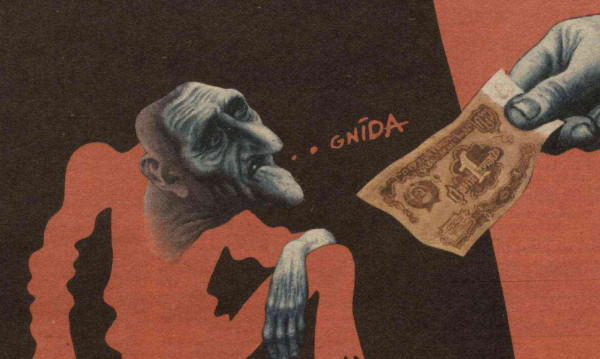TOP 5 šogad lasītākie Neatkarīgās raksti angļu valodā
3.lapa
The euro is falling like the Soviet ruble once did

The euro is becoming as useless and despicable as the Soviet ruble was when little could be bought for it.
The European Central Bank continues to print the money that countries put into circulation without hesitation, i.e. by abandoning deficit constraints and the schemes that were previously used to circumvent the restrictions. Now everything can be justified with one word - Covid-19. This magic word does not prevent the inevitable increase in the prices of goods and services, in line with the increase in the nominal value of printed money, but provides additional opportunities to deny the obvious - that it is becoming more and more expensive to survive in the times named after Covid-19. Trade restrictions imposed under the pretext of Covid-19 mask the depreciation of the euro in line with the sharp rise in the prices of goods and services.
The Central Statistical Bureau of Latvia recently provided the official version of price changes in January. Changes are expressed as inflation rates. According to this, the changes have been staying on the spot. First, the change is not by percentage, but only by tenths of one percent. Second, the 0.4% increase in prices in January compared to December is at least visually largely offset by a 0.5% decrease in prices (negative inflation or deflation) in January when compared with January 2020.
If price changes are really so slow in terms of pace and uncertain in terms of direction, then buyers were not able to notice them at all. They would have to rely on the CSB, which states in the January inflation annotation that “approximately 25 thousand prices are collected every month for the purposes of calculating the consumer price index. All price information collected in January, including remotely collected prices, went through standard validation procedures. No atypical or decreases or increases that couldn't be justified by global and seasonal trends were observed. At the end of the data validation, there was also no reason to believe that the use of alternative methods would affect the dynamics of price changes or the quality of the data. Consequently, all price information collected during the survey complies with the methodology and quality requirements." The only difference between January this year and January 2020 is that “the share of prices collected remotely (using Internet resources and telephone interviews) has increased significantly. In total, around 19% of prices in January were collected using one of the alternatives (the proportion represents only those prices that would have been collected in person in the standard situation)." You can read the whole article here
The euro is falling like the Soviet ruble once did
Uzzini pirmais, kas interesants noticis Latvijā un pasaulē, pievienojoties mums Telegram vai Whatsapp kanālā
- Iepriekšējā
- 3 / 5
- Nākamā


